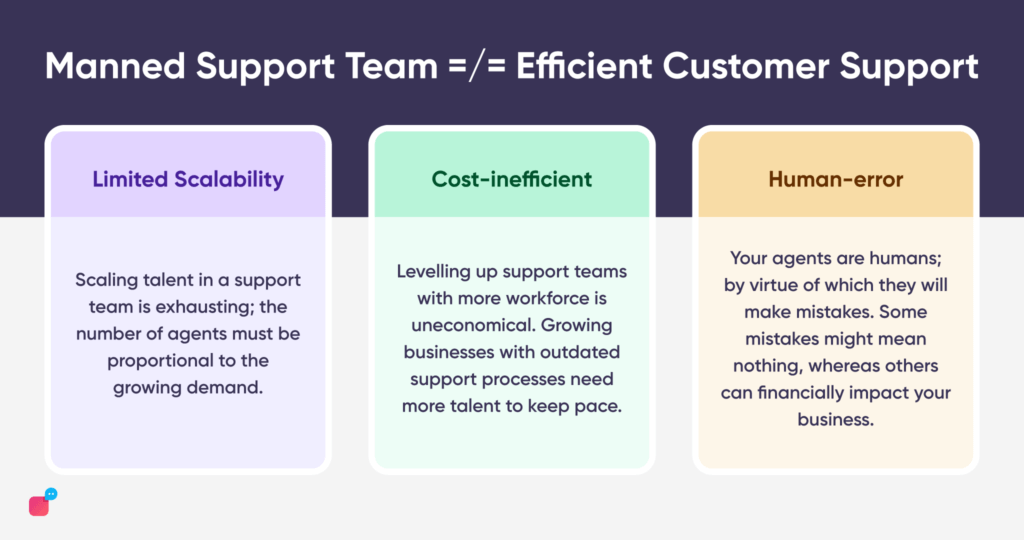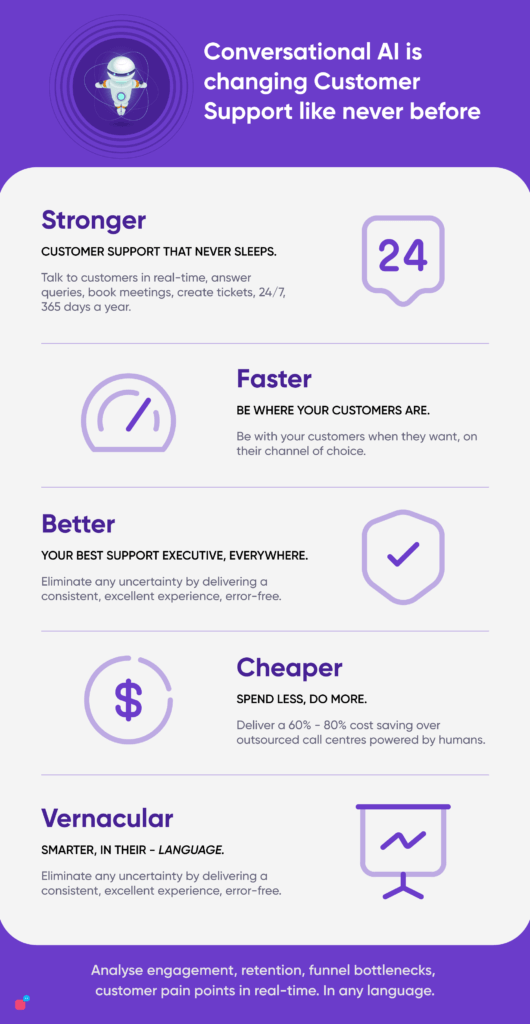What is Conversational Support and How to Automate it?

What is Conversational Support and How to Automate it?
Customer support is an often ignored facet of the Indian business ecosphere, but the numbers might convince you to think otherwise.
Research shows that winning a new customer costs 6 times more than retaining an existing one. Additional research done by Frederick Reichheld of Bain & Company (the inventor of the net promoter score) affirms this, by showing that increasing customer retention rates by 5% increases profits by 25% to 95%.
This is to say, if your customer support is less than satisfactory you’re losing money hand over fist, locally and internationally.

Foreground
Traditional support has consistently been underwhelming, and the Indian market has been slow to change. Driven by three distinct, but equally inefficient tools, phone calls, emails, and social media—India’s primary means of supporting customers can provide value, but today’s consumers crave a more convenient, conversational customer care model.
The sheer volume of inbound call center interactions is difficult for any business to handle. And when your call center is stretched to its limits, customers start to get transferred from agent to agent, having to restart the support process from the beginning each time.
Where phone calls fail to retain customer context between agents, emails give both sides of the conversation historical access to messages to improve service. But emails are largely powered and propelled by forms, tools that are historically bad for everything from lead generation to contact. Research has already shown us, that forms are terrible; the average completion rate for a contact form is 1%. Even beyond the forms, emails are an inferior method of customer support.
In a world of instant gratification where your friends and family are never more than five seconds or a text away, a business taking twelve hours to get back to you is nothing short of a crime.
Evolution

The argument for a self-serve style FAQ page is compelling, and customers will appreciate the resource. That is, till it gets annoying to scroll through 300 questions to find answers for every question. And what happens when one person’s problem falls between the cracks of self-service coverage?
Most companies don’t even scratch the surface when it comes to good customer support.
Think of all the times you’ve been left hanging on a support call with your internet service provider, that 16-email chain you sent back and forth to get that one transaction from your card cancelled and for the sake of your own sanity, don’t ever go through most B2C companies Twitter threads.
Failing at these basic support functions comes at a cost, the CEB found that 96% of customers who’ve been subjected to a high effort experience will become disloyal or move on from a company in the future.
But after all these years and failings, one thing hasn’t changed — consumers still want their complex problems solved by real human agents.
Unsurprisingly, when phone calls, emails, and @’ting companies fail consumers so spectacularly, it isn’t difficult to understand why customers want to use messaging to communicate with businesses in real time. In a recent Twilio survey, 74% of consumers said they’d rather find an answer to simple questions through a chatbot.
Mobile messaging is the most natural and convenient way to communicate with your customers. If the goal of customer support transformation is to make life easier for consumers while making brand communications more enjoyable, a conversational approach is the best way to do it.
Why is Conversational Automation better?
Conversational support automation, much like conversational marketing, beats out its traditional alternatives in almost every major metric, for instance.
1. Instant customer support, delivered.
One of the most prominent advantages of conversational support, especially on mobile messaging platforms is the ability to be the ‘always-available’ company. Unlike service calls and emails, messaging provides customers with the instant gratification that they desire, so that they can get back to their lives purchasing more of your products.
Using a hybrid bot and live chat combination, deliver that 1-2 punch of excellent and on-time customer support.
2. Continuously improve customer relationships
Research shows that nearly 70% of the world’s highest-performing support teams rely on real-time access to contextual customer data to deliver quality experiences.
Conversational support is a treasure trove of data; using Machine Learning and AI companies can analyse pain points and bottlenecks to understand not only what your customers’ problems are, but where and why in the sales or post-sales flow they go through them.
“Our customers ask us questions through Verloop.io during the sales process, when they’re considering purchasing our products. But there’s more to Verloop.io than just chat. We can proactively reach out to visitors, and with Verloop.io’s automation rich features, we’ve been able to increase the conversion rate of our site visitors by 240%.”

Instead of bouncing between multiple channels and multiple representatives, messaging gives you access to customer records. This simply makes support escalation a faster, and smoother process.
3. Boost agent efficiency and productivity
Your customer service executives and agent also struggle with workplace burn. Fielding questions every day about the same queries, day in and day out, with no creative or fulfilling aspect means they’re worn out, which causes subpar customer service.
Conversational Support allows for the automation and self-service of qualification questions and simple queries.
Take, for instance, our work with fashion e-commerce company Nykaa, valued at $13 billion.
“Using Verloop,io’s conversational automation interface, Nykaa was able to automate customer queries ranging from cancellations, returns, shipping inquiries, replacements concerns, refunds and payment hassles for over half a million customers on its app. This let Nykaa’s customer support team to let the bot field qualification questions, while the team engaged with the more pertinent purchase problems.”
Gaurav Tejwani – VP, Product, Nykaa
4. Lower cost of handling requests
Even at its best, telephonic support is an asynchronous conversation; it’s wholly 1:1. This means if you have 100 customers with queries, you need 100 agents. Conversational Support is wholly cheaper. Omnipresent automation lets a single agent handle multiple conversations at the same time. This reduces your need for several agents which drives down your support handling overheads.
Factoring in the various aforementioned benefits of messaging based support, you have a drastically reduced cost per customer interaction.
5. Improving time to resolution
The longer an agent is on a call, the more it costs your business. Aside from the costs of being engaged, clogging agents when they’re a limited resource also ends up with ticket backlogs. Which eventually and sadly ruins the customer experience.
When we signed up for Verloop.io, I had three specific requirements from the platform. The first was to shorten the amount of time it took to complete the sales process. The second was to qualify leads better, and earlier in the sales flow. The third, and most important metric behind choosing Verloop.io was to make sure both of the previous requirements were fulfilled with enterprise-grade security.
In just one month of using Verloop’s Conversational Sales Automation Live Chat, we managed to reduce the average sales start to sell process, from 18 minutes to under 5 minutes.
Varun Yadav – Head, Digital Marketing, Apollo Munich Health Insurance

Rather than making minor improvements to resolution metrics, overhauling the strategy with mobile messaging can have a significant impact. This way, brands don’t have to worry about customer churn due to repeated failed phone calls to a call centre.
6. More natural upsell opportunities
One of the underrated upsides of being always there for your customers when they need you is that your customers are there when you need them. Conversational support provides companies with unique opportunities. Successful support tickets can be used by your agents to up or cross-sell to your customers using promotions and offers.
Conversational support isn’t just limited to how your company handles queries. Implementing it is almost symbolic of a culture change so you can create deeper bonds with your customers. It takes time, effort and money to imbibe a company-wide support mechanism.
Verloop.io – Bringing your entire customer support function under one wing
Verloop.io conversational automation goes beyond what your customers are typically used to. No more delays, backlogs or consequent backlashes from angry customers with unresolved tickets!
Need some direction with beginning with conversational AI for your business? Our free eBook should probably be on your virtual shelf!







